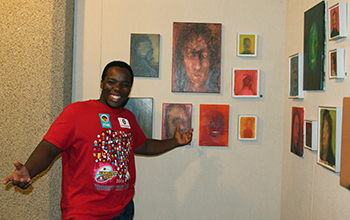Latest News Archive
Please select Category, Year, and then Month to display items
23 April 2020
|
Story Cornelius Hagenmeier
|
Photo Pixabay

The iKudu project, which is an European Union-funded Capacity Building in Higher Education (CBHE) project, has recently launched its blog, which aims to amplify the diverse voices of all iKudu stakeholders. In this space, members of the iKudu team will regularly share their views on the project and related international education topics.
The iKudu project focuses on developing a contextualised South African concept of Internationalisation of the Curriculum (IoC), which integrates Cooperative Online International Learning (COIL) virtual exchanges. The project was launched by the UFS in 2019, together with nine European and South African partner universities. It is funded by the European Union’s Erasmus+ programme with EUR999 881 (approximately R20 million) and is implemented over a three-year period.
The iKudu project is based on the fundamental belief that it is necessary to rethink internationalisation in an uncertain world. First, it is crucial to recognise and transform the power dynamics underlying international academic collaboration. Second, it is essential to develop pedagogies that allow every student to participate in international education, integrating technology where appropriate.
However, while all stakeholders agree on the fundamental tenets of the project and its principal goals, all iKudu stakeholders contribute different perspectives. In the blog, the iKudu stakeholders will provide a space for intellectual discourse on the project and related international education topics, which will allow constructive and critical engagement.
The link to the blog can be found at: https://www.ufs.ac.za/ikudu/ikudu-blogs/Transforming-Curricula-through-Internationalisation-and-Virtual-Exchanges
Pauline Gutter’s metaphorical representations of South Africa
2016-04-07

Art student, Thamsanqa Malgas views the Purgatorium exhibition at the Stegmann Gallery on the Bloemfontein Campus (UFS).
Photo: Rethabile Isaacs
|
Purgatory is a temporary condition of torment or suffering. This is the central thread of the renowned artist’s exhibition, Purgatorium, at the University of the Free State (UFS). Pauline Gutter’s exhibition was opened by Harry Siertsema on 9 March 2016 at the Stegmann Gallery on the Bloemfontein Campus.
The artist, who grew up on a farm in the Free State, is influenced by animals and farm life. “My work is on many levels a metaphorical representation of the violence of current South Africa. Some people want to move away from stigma, others adopt hysteria. The impressive yet vulnerable bulk of the bulls depicted in uncomfortable positions manifests the voiceless and powerless generation of food producers in their daily struggles for survival,” she wrote in the catalogue of the exhibition.
Prof Dirk van den Berg of the UFS Department of History of Art and Image Studies wrote an essay about the exhibition, in which he captures the lived endurance of stress and suffering which Pauline Gutter depicts vividly in Purgatorium.
“The paintings, drawings, and prints in this exhibition have, in various ways, the effect of disseminating the basic tenor of the weaning metaphor of struggle for survival into the farming domains of the land, its creatures, and its people,” said Prof van den Berg.
Art student, Thamsanqa Malgas, was very impressed with the exhibition, saying that it was a fascinating collection, and a must-see for art lovers. The exhibition closed on 1 April 2016.